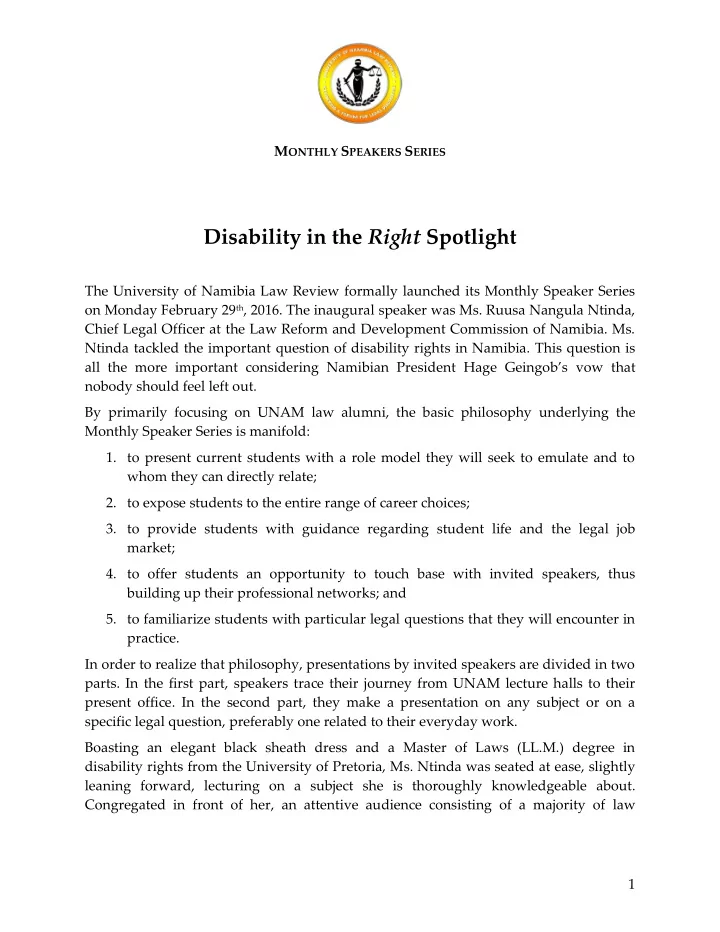

M ONTHLY S PEAKERS S ERIES Disability in the Right Spotlight The University of Namibia Law Review formally launched its Monthly Speaker Series on Monday February 29 th , 2016. The inaugural speaker was Ms. Ruusa Nangula Ntinda, Chief Legal Officer at the Law Reform and Development Commission of Namibia. Ms. Ntinda tackled the important question of disability rights in Namibia. This question is all the more important considering Namibian President Hage Geingob’s vow that nobody should feel left out. By primarily focusing on UNAM law alumni, the basic philosophy underlying the Monthly Speaker Series is manifold: 1. to present current students with a role model they will seek to emulate and to whom they can directly relate; 2. to expose students to the entire range of career choices; 3. to provide students with guidance regarding student life and the legal job market; 4. to offer students an opportunity to touch base with invited speakers, thus building up their professional networks; and 5. to familiarize students with particular legal questions that they will encounter in practice. In order to realize that philosophy, presentations by invited speakers are divided in two parts. In the first part, speakers trace their journey from UNAM lecture halls to their present office. In the second part, they make a presentation on any subject or on a specific legal question, preferably one related to their everyday work. Boasting an elegant black sheath dress and a Master of Laws (LL.M.) degree in disability rights from the University of Pretoria, Ms. Ntinda was seated at ease, slightly leaning forward, lecturing on a subject she is thoroughly knowledgeable about. Congregated in front of her, an attentive audience consisting of a majority of law 1
M ONTHLY S PEAKERS S ERIES students and a few staff members, namely Deputy Dean Lineekela Usebiu, Dr. Chiku Mchombu-Mnubi, and Dr. Tapiwa Warikandwa. It was a quiet dark-blue evening. She was talking the audience through her topic under the bright light of one of the library’s discussion rooms at UNAM’s main campus. After sharing with students pages of her life as a child in Namibia, a law student at UNAM, and a magistrate, she unfolded her argument on the use of affirmative action to enforce disability rights in the country. Speaking without notes, she opened the presentation of her theme by saying that ‘disability’ (not to be mistaken for ‘inability’ or incompetence) is a complex notion – one that is difficult to define. To be sure, Namibia has different definitions for disability. This situation partly explains why the legal framework for disability rights in Namibia is fragmented and inadequate. Tellingly, discrimination on the basis of disability is not expressly prohibited in the Namibian Constitution. She clarified that there are three ways of looking at disability. The first approach is medical, which treats disability as an abnormality that needs to be corrected. Accordingly, this approach insists on institutionalization and, in some cases, on sterilization. This was the position adopted by the World Health Organization and several pieces of Namibian laws on disability. The medical approach was criticized as discriminating and focusing on the condition, not on the person. The social perspective, on the other hand, holds that, although the medical approach may be needed for rehabilitation purposes, persons with disabilities must be blended into the wider society. This view advocates the removal of social barriers. Ms. Ntinda cautioned against creating a separate society for persons with disabilities. She explained that the condition of children with disabilities worsen when they are sent to schools for students with disabilities. The social approach was in turn criticized by human rights activists as ignoring the condition, focusing only on the person. This is something of a puzzle: Many people with disabilities, including those with albinism, are not comfortable talking about themselves because of a perception that shining more lights on their condition increases discrimination. The human rights approach is embodied in the United Nations Convention on the Rights of Persons with Disabilities, which Namibia ratified in 2007. The UN Convention lays special emphasis on the right to education, accessibility, reasonable accommodation and the multiple forms of discrimination endured by the girl child. 2
M ONTHLY S PEAKERS S ERIES The contemporary rights-based discourse suffers from limitations, too. Ms. Ntinda pointed out that reasonable accommodation does not take into account ratios, unlike affirmative action. The UNAM law graduate advocates the use of affirmative action, as provided for in the Affirmative Action Act (1998) of Namibia because it features ratios, which aim at ensuring that everybody is on par in society. From which angle or light should disability and the people living with it be properly seen? While this question is yet to be definitively answered, there was no shadow of a doubt that the roomful of students was illuminated that night by the insights and rights-based stance of the eloquent speaker. 3
Recommend
More recommend